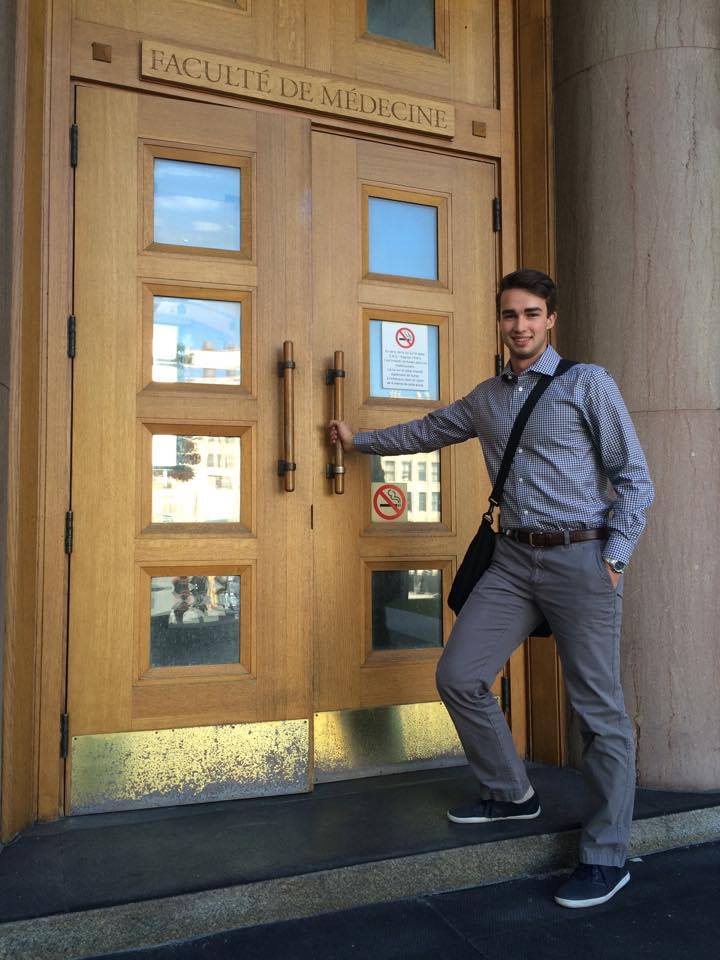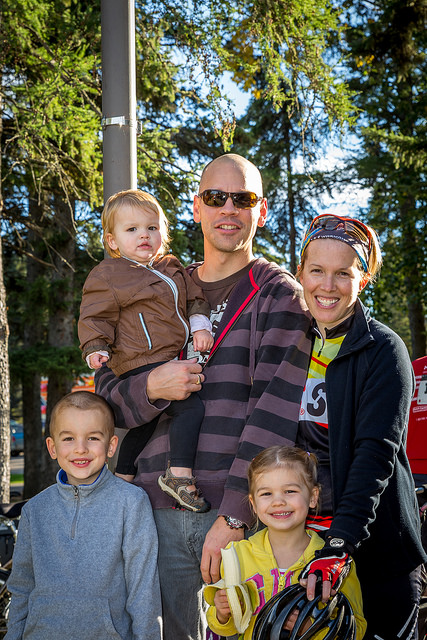Interview with Kate and Sam
I recently sat down with two of our #MSBike ambassadors, who happen to both be affected by multiple sclerosis and are involved in the medical field. They talk about their experience with medicine, their take on MS research, and being a part of the MS community. Sam called us right after his last class of the day let out at medical school at the Université de Montréal, and Kate caught up with us between making dinner for her family and running off to a shift at her office where she works as a family physician. Here’s what they shared with each other.
How has your connection to MS affected your life?
Kate: Being diagnosed with MS has really forced me to reevaluate what’s important in my life. It’s been tough for me to slow down and focus on my family and friends, as well as the areas of work that are most important to me. I think most of us in medicine are type A personality – I’m really bad for saying I can do 1,000 things like covering another shift or learning session, but then it backfires. I used to be able to juggle these requests, but I can’t anymore and it’s made me realize that I need to slow down. I used to work full time, but now I’ve cut back to three days a week.
Sam: I don’t have MS, but a little over 12 years ago, my uncle who happens to be my godfather was diagnosed. For a long time, it didn’t affect me because he was doing quite well. As the years went by, his MS hit him a lot harder and he had to leave a job that he loved as a result. That’s when I saw the disease really affect him and decided to do something about it. His diagnosis moulded me into an advocate for MS in my daily routine.

What motivated each of you to become involved in the medical field?
Kate: My interest in the medical field is totally independent from my diagnosis. I was diagnosed with MS within the last year and already had my family practice. As a child, I can remember going into the hospital to visit family members, and wondering what went on behind the doors I couldn’t peek through. But ultimately, I became a doctor because I wanted to help others and make a difference.
Sam: That’s a good point, Kate! I initially thought of going into anything within the health sector just to help others. Through my work in supporting people living with MS, I thought, why not make a career out helping them further through medicine? Going into university, I wasn’t 100 per cent sure what I wanted to do. I took kinesiology, and through my involvement in MS Bike and starting my own MS fundraiser, I grew an interest in the medical field and more specifically in the field of neurology.
What excites you the most about the future of MS research?
Kate: I did a lot of research while doing my master’s degree in neurology before I went into medicine. Research is of great interest to me, and as a proud Canadian, I’m super interested in the research that’s come out of Ottawa with the stem cell transplantation procedure. But as a family doctor, one of the things that interests me the most is the role of preventative medicine and lifestyle modification for chronic diseases. I’m really interested in how one’s diet, exercise and mindfulness can help in the management of MS symptoms. It’s an area of treatment that doesn’t get a lot of research. But it’s an area that could really go somewhere if we could get some funding to back it.
Sam: Kate, I like what you said about preventative medicine. Coming from a kinesiology background, I agree that prevention is very important. If you look at people who are regularly physically active and eat on the healthier side, they tend to be the ones who are healthier in the long run. Prevention makes a lot of sense to me, and if we can cross the world of kinesiology and the medical field, I think this could lead to great things with interdisciplinary teams—not just for MS but for all diseases in general.

Why is it important to be a part of the MS community and how have you become a part of it over the years?
Kate: My involvement is somewhat new; I rode in MS Bike three years ago as part of a friend’s team. I remember being in disbelief when I found out that she had MS. I was absolutely floored at the first MS Bike that I completed. It’s really the best event ever – everyone’s so supportive. A month after the ride, I lost all sight in my right eye and was later diagnosed with MS myself. I think that being part of a community and being able to access the resources that are provided by the MS Society is very important. I like to think that MS doesn’t affect my daily life, but there are times when I have tons of questions and don’t know what the answers are. I can read all the medical literature I want, but it doesn’t give me the answers I need. Having the MS community available to answer questions is really important, and will become even more important to me over the years.

Sam: It’s important for me to show support to my uncle. By getting involved in the MS community through MS Bike and volunteering at the local chapter, I’ve made some great friends. It’s important for me to show the people in my community that I’ve met living with MS that I’m there for them. And although I am pursuing a career to help them in the long run, first and foremost I’m going to be there as a volunteer. My goal is to open a treatment centre back home in Moncton, and then hopefully across Canada.

What would you say to people living with MS about the progress we’ve made over the years in the development of new treatments?
Kate: The MS research that’s been done over the years has allowed for the development of many new treatment options. In school I learned all about medicine, but it’s very different when you know someone who has a disease or have a disease yourself – you pay more attention to that specific disease. If you look at what’s available through research, it’s remarkable. I’ve learned that MS affects everyone differently and the ability to have new and different treatment options is really ideal, because not every treatment option works for everyone, or even to the same degree. Having many treatment options gives people hope, and these options only become available by people who are willing to research it, and who approach studying the disease in different ways.
Sam: I’m new to the scientific world, but from what I’ve learned so far, we can’t expect a miracle cure overnight. The unfortunate truth with science is that it takes time, but we will get there eventually. We’ve found treatments for many diseases which we wouldn’t have thought possible. With all the tech and research available, people with MS can expect a better quality of life. We need to focus on damage control until a breakthrough is made, and looking at the research that is being done today – this seems very promising.
What would a cure for MS mean to you?
Kate: This question always gets me… for me, a cure would alleviate worry. Right now I worry about my three kids and my husband. Will I see my two-year-old get married? Will I be able to play soccer with my five-year-old? Will my husband need help down the road? This disease elevates fear in me because I don’t deal with uncertainty well.
Sam: Kate, my take on it is much different because I don’t have MS and don’t have to deal with the same stuff you do. I would be ecstatic if there was a cure found for all those who have MS, and we could help them in the way they deserve to be helped. On the other hand, finding a cure is only one piece of the puzzle. I say this because people all over the world have MS, and not all of them would have access to the cure. So the second part of the puzzle would be going further and making sure the cure was accessible to everyone.
Kate: Sam, that’s the beauty of having someone who isn’t in the same position as me (living with MS) involved in medicine, because you present the position of wanting the good for others no matter what. Ultimately this is the goal of every doctor, but when you’re faced with a disease yourself, you start to worry about what is going on in your own little realm a bit more. So it’s great to see the perspective of someone who does not have the disease, saying that a cure is great but there is still another step – that’s how we’ll move forward.

Kate is an #MSBike ambassador, and will be riding in the Waskesiu event tomorrow! She’s a family physician and lives in Saskatoon with her husband, Scot, and three children.
Sam is an #MSBike ambassador. He currently lives in Montreal while he attends medical school at the Université de Montréal.

